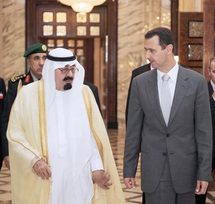
King Abdullah of Saudi Arabia and President Bashar al-Assad
Reacting to that, a Syrian foreign ministry official told Washington to stay out of Saudi-Syrian affairs.
The United States does not have the right to interfere in the discussions that took place during the visit of the Saudi king to Damascus," said the official, who spoke on condition of anonymity.
"Syria and Saudi Arabia know better than anyone the interests of the peoples of the region and the way to work, far from all foreign interference."
The Palestinians and Israelis, who have been holding indirect talks since May, broke off direct negotiations in December 2008 when the Jewish state launched a brief but bloody offensive against the Hamas militant group in Gaza, in which some 1, 400 Palestinians were killed.
Crowley said Secretary of State Hillary Clinton spoke by telephone at the weekend with Saudi Foreign Minister Prince Saud. She has also talked with her counterparts from other countries in the region, including Qatar and Jordan.
King Abdullah arrived in Syria on Thursday for talks with President Bashar al-Assad on the eve of a joint mission to Lebanon aimed at containing political tensions there.
It will be Assad's first visit to Lebanon since the 2005 assassination of Lebanese ex-premier Rafiq Hariri, which soured ties between the two countries and forced the pullout of Syrian troops from Lebanon after a 29-year presence.
Syria was widely believed to be involved in the killing but has consistently denied involvement.
The United States withdrew its ambassador to Damascus at the time, but President Barack Obama's administration sent a top envoy back this year in a bid to engage Syria's efforts for a comprehensive Middle East peace.
Its engagement policy is also aimed at driving a wedge between Syria and its longtime non-Arab ally Iran. Syria sides with Iran in backing anti-Israeli groups Hezbollah in Lebanon and Hamas in the Gaza Strip.
----------------------------------------------------------------------
The United States does not have the right to interfere in the discussions that took place during the visit of the Saudi king to Damascus," said the official, who spoke on condition of anonymity.
"Syria and Saudi Arabia know better than anyone the interests of the peoples of the region and the way to work, far from all foreign interference."
The Palestinians and Israelis, who have been holding indirect talks since May, broke off direct negotiations in December 2008 when the Jewish state launched a brief but bloody offensive against the Hamas militant group in Gaza, in which some 1, 400 Palestinians were killed.
Crowley said Secretary of State Hillary Clinton spoke by telephone at the weekend with Saudi Foreign Minister Prince Saud. She has also talked with her counterparts from other countries in the region, including Qatar and Jordan.
King Abdullah arrived in Syria on Thursday for talks with President Bashar al-Assad on the eve of a joint mission to Lebanon aimed at containing political tensions there.
It will be Assad's first visit to Lebanon since the 2005 assassination of Lebanese ex-premier Rafiq Hariri, which soured ties between the two countries and forced the pullout of Syrian troops from Lebanon after a 29-year presence.
Syria was widely believed to be involved in the killing but has consistently denied involvement.
The United States withdrew its ambassador to Damascus at the time, but President Barack Obama's administration sent a top envoy back this year in a bid to engage Syria's efforts for a comprehensive Middle East peace.
Its engagement policy is also aimed at driving a wedge between Syria and its longtime non-Arab ally Iran. Syria sides with Iran in backing anti-Israeli groups Hezbollah in Lebanon and Hamas in the Gaza Strip.
----------------------------------------------------------------------









 Home
Home Politics
Politics









